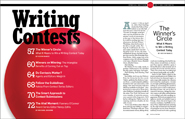Poets & Writers Magazine welcomes letters from its readers. Please post a comment on select articles at www.pw.org/magazine, e-mail editor@pw.org, or write to Editor, Poets & Writers Magazine, 90 Broad Street, Suite 2100, New York, NY 10004. Letters accepted for publication may be edited for clarity and length.
Smart Submissions
I agree with the tips suggested in “The Smart Approach to Contest Submissions” (May/June 2013), but it is important to note that judges don’t necessarily choose books that are in alignment with their own writing aesthetic. Quite often, a judge’s pick is a manuscript that is stylistically very different from the judge’s own creative work. At Four Way Books, we have seen such selections: Marianne Boruch selected Deborah Bernhardt’s Echolalia, Jean Valentine selected George Kalamaras’s The Theory and Function of Mangoes, to name a few. The point is to focus on refining your work and submit to a reputable press that you admire.
Excerpted from a comment posted on pw.org by four way books
 While I appreciate some of the suggestions, such as targeting presses, magazines, or judges who might be attracted to my work, I take exception to a certain patronizing tone that seemed to creep in when giving the nuts and bolts of submitting. I notice this more and more in submission guidelines in general. I assume the majority of your readers are seasoned writers who view the submission process as a necessary evil—all business—of the writing life. I have submitted hundreds of manuscripts in my life as a writer. I vote for a simple set of guidelines that tells me clearly what the editor wants, not what she doesn’t want.
While I appreciate some of the suggestions, such as targeting presses, magazines, or judges who might be attracted to my work, I take exception to a certain patronizing tone that seemed to creep in when giving the nuts and bolts of submitting. I notice this more and more in submission guidelines in general. I assume the majority of your readers are seasoned writers who view the submission process as a necessary evil—all business—of the writing life. I have submitted hundreds of manuscripts in my life as a writer. I vote for a simple set of guidelines that tells me clearly what the editor wants, not what she doesn’t want.
Excerpted from a comment posted on pw.org by SSOUSA
In addition to the points in this article, I’d add the following: Look locally, in terms of geographic region and subject matter expertise; watch out for popularity-based or public voting contests that are more marketing than writing; and study past winners.
Excerpted from a comment posted on pw.org by competitivewriter
The Truest Truth
Regarding Ruth Ozeki’s “A Crucial Collaboration: Reader–Writer–Character–Book” (May/June 2013), how tiresome to read, once again, that of all forms of literature “novels are special.” How tiresome that Ozeki supports this assertion with two of the most often stated, though unsupportable, arguments: “Writers are at the mercy of their creations” and “Nothing is truer than fiction…because it doesn’t pretend to be true.” There is a certain mystery surrounding inspiration, and it does sometimes feel like characters have a life of their own. They don’t. Without the author, there is no character. Writers are “at the mercy” of their own deeply complicated, amazingly creative, and barely understood minds. This applies to novelists, memoirists, and poets. Ozeki writes that because people are always changing, the words we read today will have a different meaning upon later readings. I agree with this. Much of what I believed to be true at nineteen no longer applies now that I’m fifty. The same is true of poetry. People decide what is true and what isn’t based on their age, experiences, and beliefs. There is no such thing as a truer truth.
Deb Hohenthal
Salt Lake City, Utah
Open Your Eyes
Once I realize the intricacy of a character, a process Tony Eprile addresses in “Open Your Eyes: Seeing Like a Writer” (March/April 2013), I discover my main story line. It comes to me like an episode of a television show: I understand what drama, saga, and sophistication I want to enter my story and characters. So Eprile is right: If we can’t interpret and find the depth of our characters, we can’t hope to fully express the path that enriches both thought and theme.
Danny Allen
Jefferson City, Missouri






